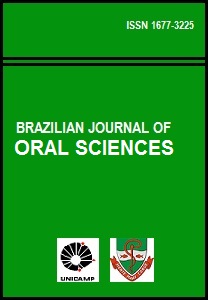Abstract
Aim: The purpose in this study was to evaluate the degradation force of conventional synthetic orthodontic elastics and synthetic orthodontic elastics with memory properties. Methods: Specimens of each material (Plastic chain, Memory chain and Closed spring NiTi) were stretched and adapted to the test specimens composed of resin plates and orthodontic wires, simulating retraction units. Degradation force was verified in an Instron universal test machine at the following intervals: 1, 2, 18, 24, 48 h; 7, 14, 21, and 28 days. Data (gF) were analyzed statistically using Friedman and Kruskal-Wallis tests at 5% significance level. Results: It was observed a significant force reduction of Plastic chain and Memory chain after 2 h (p<0.05). For NiTi spring significantly force reduction was observed after 18 h, but no significant change was showed up to 21 days. NiTi spring showed force significantly higher than synthetic elastomeric materials (p<0.05). There was no significant difference between Memory chain and Plastic chain up to 24 h. However, from 48 h to 21 days Memory chain showed force significantly higher than Plastic chain. Conclusions: There was higher force degradation in the synthetic elastomeric materials in comparison with NiTi springs, which allows the preferential indication of these space closure jigs for clinical use.The Brazilian Journal of Oral Sciences uses the Creative Commons license (CC), thus preserving the integrity of the articles in an open access environment.
Downloads
Download data is not yet available.

